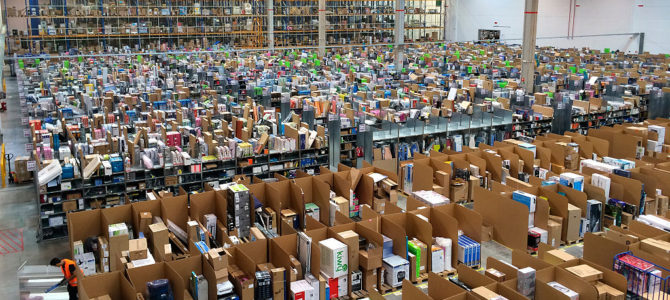
Last Wednesday, thanks to a surge in Amazon’s stock price, Jeff Bezos became the richest person in the world. Bill Gates swiftly reclaimed the top spot, but the milestone marked a turning point. Gates is no longer changing the way producers and consumers participate in the marketplace, whether locally or globally. Bezos is.
Today, most of the attention to Amazon’s reworking of commodity supply is swirling around the production side. That’s reasonable enough, but the consumption side is more interesting, because that’s where the real social transformation Amazon could encourage will really play out.
Amazon has put producers on the defensive. Some companies are worried they’ll be gobbled up by the Thing That Ate Whole Foods. Others are more concerned they’ll be cast aside or made obsolete. Still others are bent on ensuring they protect their dominance as so much commerce takes place within Amazon itself.
“We’re looking for ways to improve the Nike consumer experience on Amazon by elevating the way the brand is presented and increasing the quality of product storytelling,” Nike CEO Mark Parker said on a recent earnings call. Amazon has the initiative. Retailers don’t.
Are We Merely Consumption Machines?
Now look at consumers. The cynical or jaded explanation for Amazon’s huge success and Bezos’s immense wealth is that we are all becoming pampered shut-ins who love having dumb stuff shipped to our fat faces. Now, idiocracy is real, and we are happy to give away not only our most intimate personal information but surrender up all personal initiative to Amazon’s incentives, which become so complete and all-pervasive that they start to feel more like instincts.
There is also a feel-good, optimistic version of this dark dystopia. We are not ugly subhuman creatures who have foolishly allowed digital indignities to infest every aspect of our physical lives. From the sunnier view, we are really actualizing our humanity by pulling ourselves out of the alien world of online. We are creating a more healthful balance where the Internet is the guest and we are the hosts, not the other way around. In fact, using the Internet to perfect our personal projects of consumption, self-care, and membership creates a sustainable and rewarding foundation for peaceful, pro-social life.
We can argue a lot about how good or bad these kinds of lifestyles are, but the general type of consumer they describe is easily recognizable. Many millions of people, unrestricted by identity or ability, can become this kind of consumer, if they are not one already. Even if they struggle in the wider world with various barriers or obstacles to their life plans or aspirations, here, in the places digital life has been fully welcomed into their homes, they can thrive comfortably.
We Can Also Be Savvy Niche Shoppers
This alone would be enough to convince most of us that Amazon has a bright future ahead, possibly one in which it corners the market on delivering that experience at scale. But the company also appeals to a different kind of consumer. Imagine the opposite of the Gwyneth Paltrow-emulating person whose converging interests in wellness, cosmetics, fashion, spirituality, food, and décor make Amazon feel like the perfect houseguest or the perfect cross between a servant and master.
Perhaps you picture the most respectable, dignified, and well-adjusted prepper possible, or a young father whose considered idea of integrity, independence, and initiative plays out as a sort of cross between #vanlife and the Gorilla Mindset. For this person, too, Amazon’s suite of products and logistical services could play a central role. But this time, rather than facilitating their ever more smooth and complete integration into the warm fabric of the tame society and the domesticated economy, Amazon can help them break loose from those structures in an incredibly cheap and powerful way.
They’ll have to offer up some personal information to gain direct access to the materiel and information they need to pursue their remote or renegade ways of living. But the massive amount of involuntary cultural entanglements they will be able to shed in the process will probably strike them as a significant bargain, and maybe an indispensable one.
Amazon is so important because it can deliver the goods for these two distinct types of American, the Gooper and the Gorilla, who are on track to have less and less in common with every passing hour. At a time when many technologies of convenience are now reflexively assumed to be softening or sweetening our human nature, Amazon’s success should encourage us to think of what other advancements might be adapted to the needs and desires of people determined to get hardier or saltier in order to quietly build something new.









